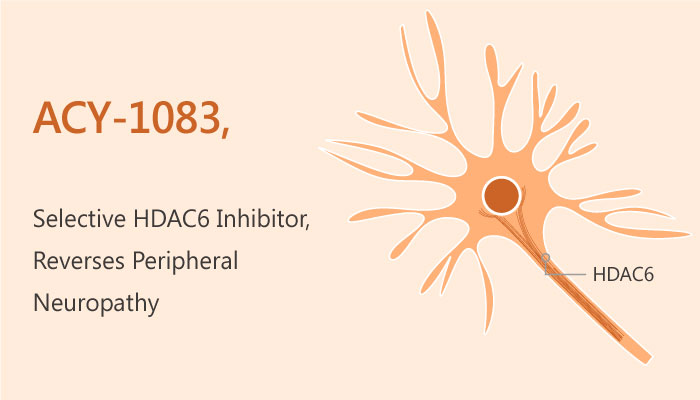Nerves carry messages from the brain to the rest of the body. Peripheral neuropathy occurs when the peripheral nervous system is damaged. Chemotherapy-induced peripheral neuropathy is one of the most commonly and widely reported adverse side effects of cancer treatment. The symptoms of cemotherapy-induced peripheral neuropathy include pain, numbness, tingling, and temperature sensitivity.
Histone deacetylase 6 (HDAC6) is a unique enzyme with specific structural and functional features.HDAC6 expression and functions link to cell transformation. Depending on the type of cancer, the HDAC6 expression level is a good prognosis indicator of tumor aggressiveness. Further analyses of HDAC6 functions reveal the involvement of the protein in cellular processes dependent and independent of its catalytic activity. Accordingly, HDAC6 downregulation or the inhibition of its catalytic activity by a specific drug significantly
In this study, Krukowski K, et al used a novel HDAC6 inhibitor ACY-1083. ACY-1083 shows 260-fold selectivity towards HDAC6 vs other HDACs. To investigate whether inhibition of HDAC6 reverses existing chemotherapy-induced peripheral neuropathy, researchers used the highly selective HDAC6 inhibitor ACY-1083. ACY1083 has a negligible inhibitory activity against other enzymes. In vitro, ACY-1083 inhibits HDAC6 with an IC50 of 3 nM and is more selective for HDAC6 than all other classes of HDAC isoforms HDAC1-9. In addition, the pharmacological inhibition of HDAC6 with ACY-1083 effectively prevents Cisplatin-induced mechanical allodynia in mice. ACY-1083 enhances mitochondrial bioenergetics and contents in the tibial nerve and dorsal root ganglia neurons of Cisplatin-treated mice. The ability of ACY-1083 to prevent the primary dose-limiting toxicity of Cisplatin would potentially allow oncologists to dose higher, longer, or both and thus achieve better clinical outcomes for cancer.
Reference:
Pain. 2017 Jun;158(6):1126-1137.
